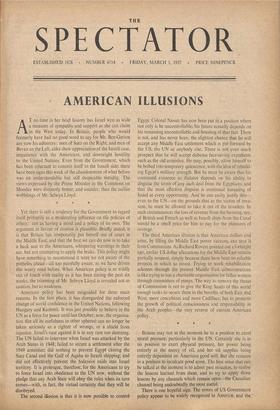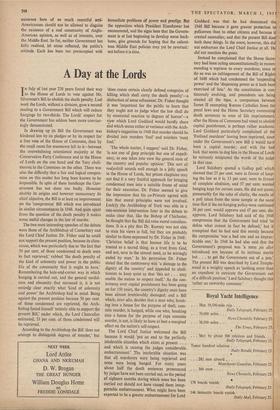AMERICAN ILLUSIONS
AT no time in her brief history has Israel won as wide a measure of sympathy and support as she can claim Yet there is still a tendency for the Government to regard itself priMarily as a moderating influence on the policies of others : not as having a mind and a policy of its own. The argument in favour of caution is plausible. Briefly stated, it is that Britain has temporarily put herself out of court in the Middle East; and that the best we can do now is to take a back seat to the Americans, whispering warnings in their ear, but not attempting to apply the brake. This policy might have something to recommend it were we not aware of the potholes ahead—all too painfully aware, as we have driven this weary road before. When American policy is as wildly out of touch with reality as it has been during the past six weeks, the trimming of Mr. Selwyn Lloyd is revealed not as caution, but as weakness.
American policy has been misguided for three main reasons. In the first place, it has disregarded the enforced change of world confidence in the United Nations, following Hungary and Kashmir. It was just possible to believe in the UN as a force for peace until last October; now, the organisa- tion (for.all its usefulness in other spheres) can no longer be taken seriously as a righter of wrongs, or a shield from injustice. Israel's case against it is in any case too damning. The UN failed to intervene when Israel was attacked by the Arab States in 1948; failed to secure a settlement after the 1949 armistice; did nothing to prevent Egypt closing the Suez Canal and the Gulf of Aqaba to Israeli shipping; and did not effectively prevent the fedayeeti raids into Israel territory. It is groteSque, therefore, for the Americans to try to force Israel into obedience to the UN now, without the pledge that any Arab State will obey the rules when its turn comes—with, in fact, the virtual certainty that they will be disobeyed.
The second •illusion is that it is now possible to control Egypt. Colonel Nasser has now been put in a position where not only is he uncontrollable; his future-actually depends on his remaining uncontrollable and boasting of that fact. There is not, and has never been, the slightest chance that he will accept any Middle East settlement. which is ptit forward by the US, the UN or anybody else. There is not even much prospect that he will accept dubious face-saving expedients such as the old armistice. He may, possibly, alloW himself to be bribed into temporary quiescence, with the idea of rebuild- ing Egypt's military strength. But he must be aware that his continued existence as dictator depends on his ability to disguisethe terms of any such deal from the Egyptians; and that the most effective disguise is continued harassing of Israel at every opportunity. And he can easily justify this— even to the UN—on the grounds that as the victim of inva- sion,.he must be allowed to take it out of the invaders. In such circumstances the loss of revenue from the banning, say. of British and French.as well as Israeli ships from the Canal . would be a small price for him to pay for the pleasures of revenge.
The third American illusion is that American dollars and arms, by filling the Middle East power vacuum, can save it from Communism. As Richard Rovere pointed out a fortnight ago, earlier US dollar allocations for the Middle East remain partially unspent, simply because there have been no reliable projects in which to invest. Trying to work rehabilitation schemes through the present Middle .East administrations is like trying to run a charitable organisation for fallen women through committees of pimps. The way to remove the threat of Communism is not to give the King Sauds of this world enough tanks to secure them in the benefits of both East and West, more concubines and more Cadillacs; but to promote the growth of political consciousness and responsibility in the Arab peoples—the very reverse of current American policy.
Britain may not at the moment be in a position to exert moral pressure, particularly in the UN. Certainly she is in no position to exert physical pressure, her power .being entirely at the mercy of oil, and her oil supplies being entirely dependent on American good will. But she remains in a, position to inculcate good sense. The best sense that can be talked at the moment is to admit past mistakes, to realise the lessons learned from them, and to try to apply those lessons by any channels which remain open—the Canadian channel being undoubtedly the most useful.
There is one hopeful sign. The errors of US Government policy appear to be widely recognised in America; and the:
existence here of so much resentful anti- Americanism should not be allowed to disguise the existence of a real community of Anglo- American opinion, as well as of interests, over the Middle East. So far, neither Government has fully realised, let alone reflected, the public's attitude. Each has been too preoccupied with immediate problems of power and prestige. But the opposition which President Eisenhower has encountered, and the signs here that the Govern- ment is at last beginning to develop some back- bone, give grounds for hoping that the calami- tous Middle East policies may yet be reversed: not before it is time.



































 Previous page
Previous page